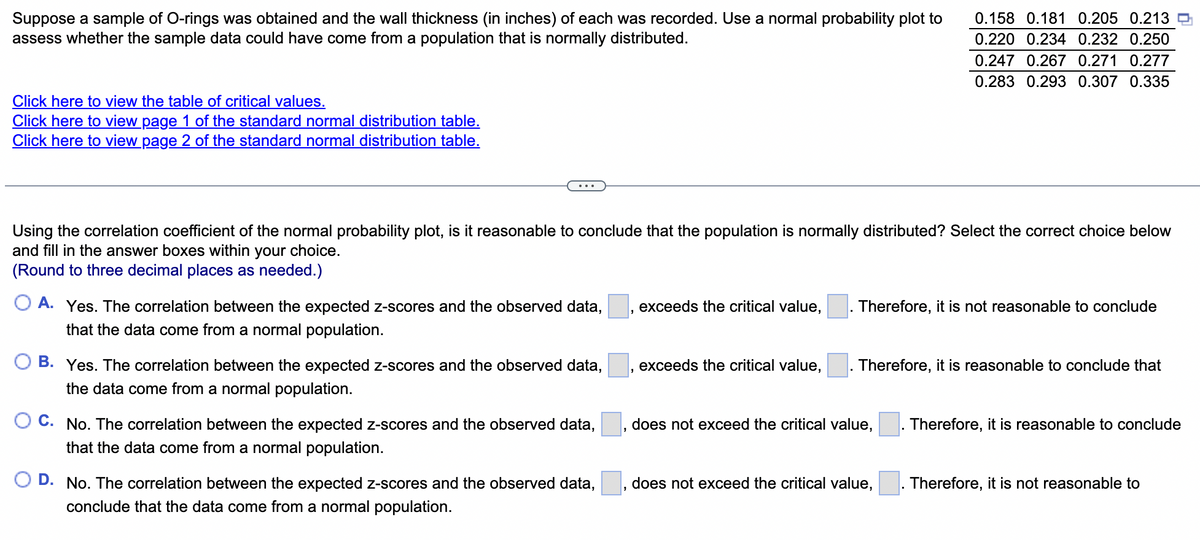Suppose a sample of O-rings was obtained and the wall thickness (in inches) of each was recorded. Use a normal probability plot to assess whether the sample data could have come from a population that is normally distributed. 0.158 0.181 0.205 0.213 O 0.220 0.234 0.232 0.250 0.247 0.267 0.271 0.277 0.283 0.293 0.307 0.335 Click here to view the table of critical values. Click here to view page 1 of the standard normal distribution table. Click here to view page 2 of the standard normal distribution table. Using the correlation coefficient of the normal probability plot, is it reasonable to conclude that the population is normally distributed? Select the correct choice below and fill in the answer boxes within your choice. (Round to three decimal places as needed.) O A. Yes. The correlation between the expected z-scores and the observed data, that the data come from a normal population. exceeds the critical value, Therefore, it is not reasonable to conclude O B. Yes. The correlation between the expected z-scores and the observed data, , exceeds the critical value, Therefore, it is reasonable to conclude that the data come from a normal population. O C. No. The correlation between the expected z-scores and the observed data, does not exceed the critical value, Therefore, it is reasonable to conclude that the data come from a normal population. O D. No. The correlation between the expected z-scores and the observed data, does not exceed the critical value, Therefore, it is not reasonable to
Suppose a sample of O-rings was obtained and the wall thickness (in inches) of each was recorded. Use a normal probability plot to assess whether the sample data could have come from a population that is normally distributed. 0.158 0.181 0.205 0.213 O 0.220 0.234 0.232 0.250 0.247 0.267 0.271 0.277 0.283 0.293 0.307 0.335 Click here to view the table of critical values. Click here to view page 1 of the standard normal distribution table. Click here to view page 2 of the standard normal distribution table. Using the correlation coefficient of the normal probability plot, is it reasonable to conclude that the population is normally distributed? Select the correct choice below and fill in the answer boxes within your choice. (Round to three decimal places as needed.) O A. Yes. The correlation between the expected z-scores and the observed data, that the data come from a normal population. exceeds the critical value, Therefore, it is not reasonable to conclude O B. Yes. The correlation between the expected z-scores and the observed data, , exceeds the critical value, Therefore, it is reasonable to conclude that the data come from a normal population. O C. No. The correlation between the expected z-scores and the observed data, does not exceed the critical value, Therefore, it is reasonable to conclude that the data come from a normal population. O D. No. The correlation between the expected z-scores and the observed data, does not exceed the critical value, Therefore, it is not reasonable to
MATLAB: An Introduction with Applications
6th Edition
ISBN:9781119256830
Author:Amos Gilat
Publisher:Amos Gilat
Chapter1: Starting With Matlab
Section: Chapter Questions
Problem 1P
Related questions
Question

Transcribed Image Text:Suppose a sample of O-rings was obtained and the wall thickness (in inches) of each was recorded. Use a normal probability plot to
assess whether the sample data could have come from a population that is normally distributed.
0.158 0.181 0.205 0.213 D
0.220 0.234 0.232 0.250
0.247 0.267 0.271 0.277
0.283 0.293 0.307 0.335
Click here to view the table of critical values.
Click here to view page 1 of the standard normal distribution table.
Click here to view page 2 of the standard normal distribution table.
Using the correlation coefficient of the normal probability plot, is it reasonable to conclude that the population is normally distributed? Select the correct choice below
and fill in the answer boxes within your choice.
(Round to three decimal places as needed.)
A. Yes. The correlation between the expected z-scores and the observed data,
exceeds the critical value,
Therefore, it is not reasonable to conclude
that the data come from a normal population.
B. Yes. The correlation between the expected z-scores and the observed data,
the data come from a normal population.
exceeds the critical value,
Therefore, it is reasonable to conclude that
C. No. The correlation between the expected z-scores and the observed data,
that the data come from a normal population.
does not exceed the critical value,
Therefore, it is reasonable to conclude
D. No. The correlation between the expected z-scores and the observed data,
does not exceed the critical value,
Therefore, it is not reasonable to
conclude that the data come from a normal population.
Expert Solution
This question has been solved!
Explore an expertly crafted, step-by-step solution for a thorough understanding of key concepts.
This is a popular solution!
Trending now
This is a popular solution!
Step by step
Solved in 2 steps with 1 images

Recommended textbooks for you

MATLAB: An Introduction with Applications
Statistics
ISBN:
9781119256830
Author:
Amos Gilat
Publisher:
John Wiley & Sons Inc

Probability and Statistics for Engineering and th…
Statistics
ISBN:
9781305251809
Author:
Jay L. Devore
Publisher:
Cengage Learning

Statistics for The Behavioral Sciences (MindTap C…
Statistics
ISBN:
9781305504912
Author:
Frederick J Gravetter, Larry B. Wallnau
Publisher:
Cengage Learning

MATLAB: An Introduction with Applications
Statistics
ISBN:
9781119256830
Author:
Amos Gilat
Publisher:
John Wiley & Sons Inc

Probability and Statistics for Engineering and th…
Statistics
ISBN:
9781305251809
Author:
Jay L. Devore
Publisher:
Cengage Learning

Statistics for The Behavioral Sciences (MindTap C…
Statistics
ISBN:
9781305504912
Author:
Frederick J Gravetter, Larry B. Wallnau
Publisher:
Cengage Learning

Elementary Statistics: Picturing the World (7th E…
Statistics
ISBN:
9780134683416
Author:
Ron Larson, Betsy Farber
Publisher:
PEARSON

The Basic Practice of Statistics
Statistics
ISBN:
9781319042578
Author:
David S. Moore, William I. Notz, Michael A. Fligner
Publisher:
W. H. Freeman

Introduction to the Practice of Statistics
Statistics
ISBN:
9781319013387
Author:
David S. Moore, George P. McCabe, Bruce A. Craig
Publisher:
W. H. Freeman